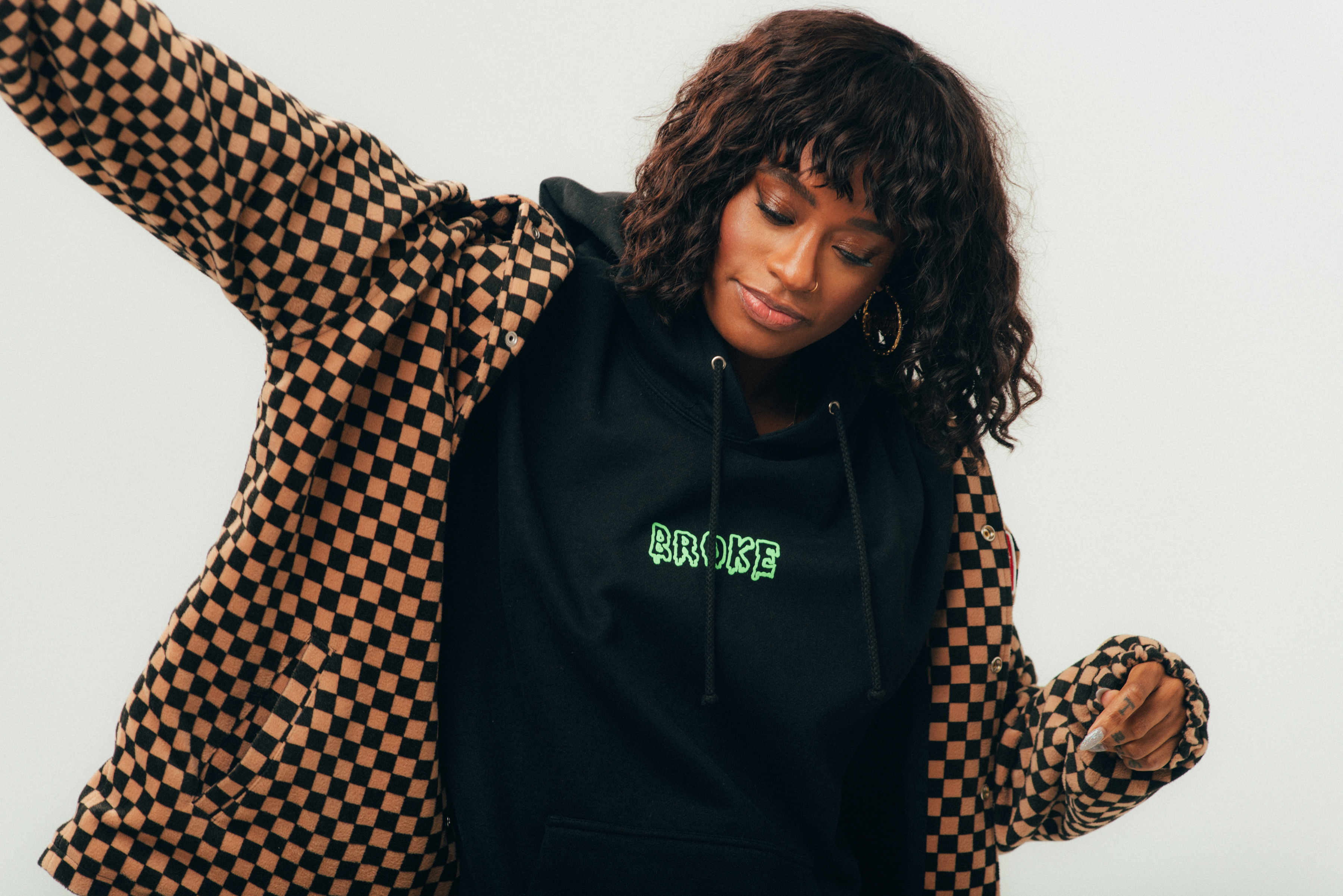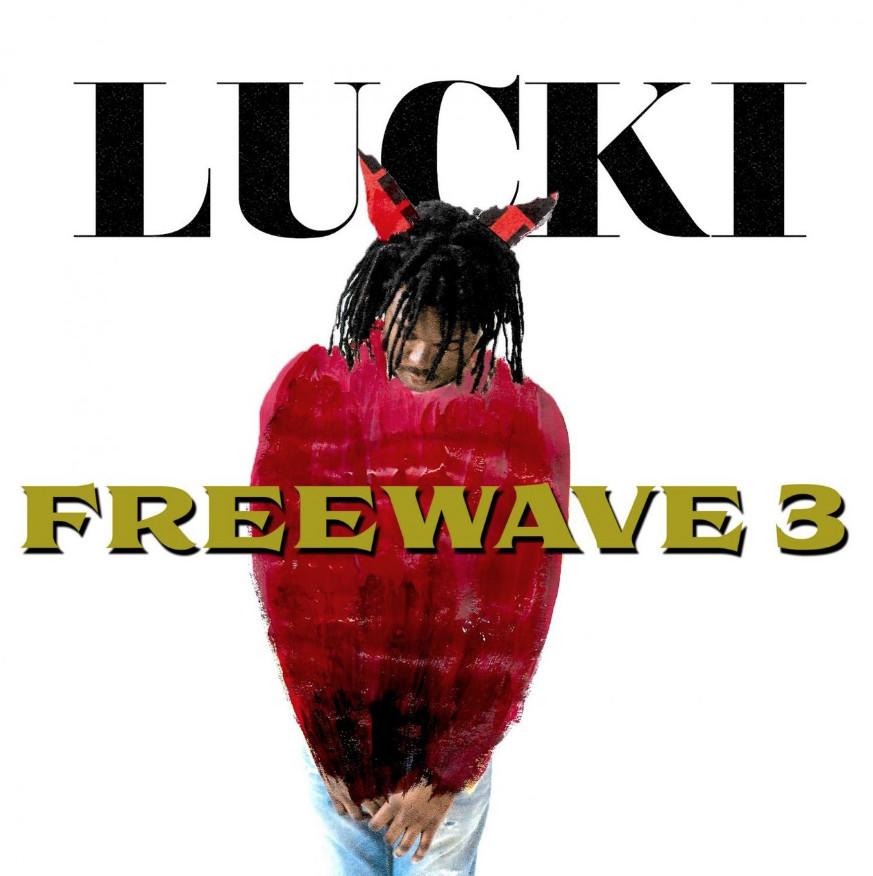Spin’s new Rap Monthly column interviews an artist making waves, reviews selections from the past month, and holds some lame shit accountable.
Nobody writes songs about the apathy of ignoring phone calls quite like Kari Faux. Whereas Lady Gaga and Beyoncé’s “Telephone” sets its righteous rejection in the club, or Z-Ro’s “Call My Phone” (Faux’s favorite contribution to the form) portrays a depressed hustler, “Facetious,” from Faux’s 2017 project Primary, channels the everyman energy of laying in bed past noon on a sunny day, too tired to engage. The soft refrain, “I don’t want to deal right now,” floats over warm, sedated funk that might otherwise soundtrack scrambling eggs. “Leave Me Alone,” the lead single off Faux’s new EP Cry 4 Help, functions like a sequel. There’s the slack pastel groove—reminiscent of the post-Odd Future oeuvres of Tyler, the Creator and her frequent collaborator Matt Martians—cheery melody, and daffy, pitched-up backing vocals, wielded ironically: “Don’t hit my line,” she sings. “Don’t call my phone.”
When we meet on a bougie arts block in Los Angeles’ Franklin Village on the last Wednesday of February, though, Faux’s phone brings her joy. Earlier in the morning, she released the cover art for Cry 4 Help: a photo of herself bent over in fishnets, flipping the bird between her legs. Curren$y, who appears on the third track “In the Air,” has just re-posted the image on his Instagram. “That’s where we’re at,” Faux tells her manager with a grin. Over green tea, she points out that someone already commented on the photo with some variation of “you don’t respect yourself,” but says that type of response was her goal. “I’m gonna hold up a mirror to how ridiculous these respectability politics are,” she says. “They’re fucking stupid.”
Teasing confrontation is her style. Faux gained a reputation earlier this decade for droll raps and web-savvy visuals like “Rap Game Daria” and the Very Online Person-dissing “On the Internet.” She caught the eye of Donald Glover, whose team briefly managed her, and who guested on “Gahdamn.” She watched Atlanta develop from an idea into an institution, and still takes inspiration from it today. “You have to remember to not get comfortable,” Faux says of the show. “Do some shit that’s fearless. Make fearless art. Get in people’s faces.” She left Glover’s orbit to work independently, though, hesitant about losing herself in the wake of his hype. “I need to move as an individual,” she says.
Bouncing between Los Angeles, her native Little Rock, and New York in recent years, Faux polished a subdued, frequently silly, but affecting sound: droopy bass lines, funky keys, and playfully fried vocal arrangements. Cry 4 Help features some of the most vulnerable writing of her career. “Medicated” confronts bipolar swings and dissatisfaction with prescription drugs, while “Latch Key” tells the story of a miscarriage at 15 and the years of dodged trauma. The wit of Faux’s writing and arrangements keeps things loose throughout. I was curious to ask how humor informs her work, and perhaps inevitably, the conversation skirted around tears. It has been edited and condensed for clarity.
This EP features some very sad shit, but it opens [on “Medicated”] with you laughing. Why did you make that choice?
You notice how it’s laughter but it fades away. That’s where I was in that moment, where I was on such a high. Like, I had walked my first fashion week show. I was seeing this guy. He was so cool. He was French. You know, like, such a cool dude. I was on such a high. I was like, yeah, my life is fucking taking off, doing shit. I’m DJ’ing now. And then I just felt like last year was just so fucking hard. Shit just started happening, which unearthed a lot of trauma for me that I had not dealt with. It just took me to a really dark place and ultimately I was so uninspired by everything. I couldn’t make music for the life of me. It didn’t move me, it didn’t make me feel nothing. And then, I felt like I just got to such a rock bottom moment that I was just like, dawg, fuck it. Tried to go to therapy. That shit cost me an arm and a fucking leg that I didn’t have, you know what I mean? It wasn’t worth it.
Had you thought about music in that way, as rehabilitative, before this project?
No, not rehabilitative. As far as expression, you know, yeah, it’s always some kind of therapy. But in the way that this project has saved my life, I’ve never thought that way about my music. You know what I mean? Not for me. Like, this project saved my life. This shit was for me. All my other music has been like, Oh yeah, I’m gonna make this, I’m gonna put it out, and other people are gonna like it. I like it, but other people are gonna like it. This shit is for me. This is the one that made me see that, Oh, no, you’re tight as fuck and you should keep fucking going. Just keep going, dude. Shit only can get better. It couldn’t have gotten any worse than where I was.
The cover art is both silly and serious as well.
I’ve always struggled with my sexuality. I’ve always struggled with how am I supposed to carry myself. Femininity, I should say. When you grow up Southern Baptist, you grow up in the Baptist church, everybody says you’re supposed to be this way, and this is presentable, and this is how you get a husband. It’s these rules that somebody told you, and then you grew up, and you internalize them. And now these rules that somebody else made up for themselves—and they project it onto you—now you, by now, are implementing those boundaries and rules for yourself, when that’s not even really how you feel about the world around you. I’m 26, bro, 26, and I don’t really know what it means to be a woman, in the sense of what a woman is supposed to be in society’s standard or view. I know what it means to me. What it means to me is just me being me. But it’s like, do I align with what other people think a woman is? Maybe, maybe not, don’t know. I can’t give a fuck about that. I think that cover is just me being like, fuck it, now am I a woman? Now do you [respect me]? Also, if this now makes you see me in a different light, fuck you.
When did cell phones start feeling like a burden to you?
It really happened recently. I’d probably say in the last two years, the last two years. I guess the more people that know me, or know of me, now more people are trying to reach me. And then on top of the fact that I’m spending time on social media, which is an energy exchange, no matter how you look at it. You have to think about it. You wake up in the morning and you get on your phone, probably talk to, like, 10 to 20 people before you’ve even spoken a real word. You know how draining that is? We’re not even thinking about how fucking draining that is. Then just imagine getting up and then going to work, or going to school, and then exerting more energy, and then you go home to get back on your phone, to then exert more energy, and you’re not taking any real time for yourself. I mean, like, damn. That’s why we so fucking tired cause we’re just giving it all the fuck away all the time. So I think that me understanding that now, like, fuck dude, I really gotta learn how to. Sometimes I’ll delete apps off my phone and I just feel so free. But then I’m like, fuck, I gotta promote this video.
Any final words?
Touch yourself. You’ll be a lot happier. That’s it. That’s all I have.
Look Back At It
Over the past month, Spin enjoyed rap music that evoked D’Angelo, screwed with texture, and didn’t overthink things, by the grace of God. These and other recommendations below.
Top Spin: Lucki – Freewave 3
Once—circa 2013—Lucki (then Lucki Eck$) was an intriguing but stray voice in a multifarious Chicago rap scene that was still just beginning to make itself known nationally. Today, the title of the then-teenager’s debut tape, Alternative Trap, seems silly. But in its time—whether you liked the title or not—it seemed like an earnest attempt to patent a new, hard-to-characterize sound. Now the better part of popular rap music could be described as some definition of “alternative trap.” Drill and trap bloodlines have merged and become geographically decentralized, and the amalgamated trap and cloud rap production styles with which Lucki was experimenting sound like songs you might reasonably hear on hip-hop radio. Today, the more mature Lucki’s downcast mumble and disregard for structural templates point toward both modern Soundcloud rap and other avant-garde styles, recalling elements of both the recent output of Playboi Carti and Lucki’s booster Earl Sweatshirt.
As a result, Lucki’s latest effort, Freewave 3, is far from groundbreaking stylistically in its 2019 context. But it’s an undeniably strong effort from a rapper with a self-assured style that is designed to sound incidental, based around an undeniably distinctive vocal timbre and sense of pacing: erratic but deliberate, like waves lapping in. The tape is a meditation on addiction, dramatizing the push-and-pull between the desire for human relationships and the escape in drugs, and between boastful and self-deprecating bars. Lucki understands how to mine these contradictions, familiar in so much rap made by teenagers in the late 2010s. “Let’s skip the sad part, I know this like some movie shit / Let’s skip the sad part, let’s get back to them coupes and shit,” he raps on opener “Politics.”
The soundscapes are suitably bleak, with several provided by rising St. Louis producer and Valee compatriot Chasethemoney. But the tape’s best moments come when Lucki plays against the thrust of the foggy production, slipping into light, sing-songy cadences he positions in odd ways across the bar. Occasionally, he settles into something like a hook we can relish for a moment before the near-two-minute song ends. Like any of the rapper’s previous projects, Freewave 3’s appeal is rooted in Lucki’s peculiar brand of stamina and precision as a stylist; he never lets his voices get pulled to extremes by his often-harrowing subject matter. —Winston Cook-Wilson
B. Cool-Aid – Syrup
Syrup, the new album from the duo of underground nomad Pink Siifu and Los Angeles producer Ahwlee, is less than 15 minutes long, but in that time manages to encompass a whole generation of free-spirited rap and R&B, sitting somewhere comfortably in between the dust and crackle of J. Dilla and the zooted muffles of Madvillainy. The best song, though, is “Me&U” a laconic and airy R&B sketch that recalls the way in which the songs on D’Angelo’s Voodoo seem to curl up in the air and coalesce in real time, but with the raw production of an outlaw like Cody Chestnutt. Syrup is bookended by an intro and an outro that sample the ambient noise of a typical day—the morning radio show “The Breakfast Club” to start and conversations at Waffle House to finish—as if to emphasize that the album is happy to just float on by. Against its best intentions, it will grab you anyway. — Jordan Sargent
Bari – MSTRGLSS
If it’s cliche to compare rising Chicago producer Monte Booker—with his found percussion sounds, left-field textures, and vocal-tic layering—to Timbaland, accept my apology, and then listen to “Luhbish” by the St. Louis rapper Bari. (After that, enjoy Booker’s Instagram story wherein he builds an instrumental from household items like a foley artist, or Björk.) A longtime Smino collaborator, Bari takes some of Booker’s sharpest beats yet and crafts minimalist songs that punch above their weight. Obliquely chopped strings, idiophone progressions that loop at unexpected angles, and hard-to-identify accents score Bari’s images of luxury, which he croons at a rapid pace, usually ditching verse-chorus structures to drill catchy refrains into your head. There are memorable lyrical details, like a Testarossa with “interior mimosa” and cash turned to “green confetti,” but the best tracks are all mood, privileging Bari’s energy, melodies, Max B-like drawl, and various oohs, ayes, and ahhs as more toys for Booker. The best example is “Relax,” which is built around a whining digital scratch note that whirls askew, faster than the surrounding beat, doing little more than alternating between hooks. Theirs is a partnership with balance. —Tosten Burks
DaBaby – Baby on Baby
In a decade marked by weighty, ambitious rap albums from the likes of Kendrick Lamar, Kanye West, or Travis Scott—artists who turn their albums into grandiose statements or movie-level blockbusters overstuffed with producers and guest stars (sometimes just on one song)—it can feel like a sensory overload just to press play on a new rap album. That’s what makes a tape like DaBaby‘s Baby On Baby pleasantly surprising and quietly thrilling—it’s a project that’s only concerned with banging out of your car trunk, showcasing a rapper who simply rhymes his ass off. “Ain’t a nigga alive can take credit from me/ I was already lit when they found me,” the Charlotte, North Carolina newcomer spits on the opener “Taking It Out,” a track that hits you in the chest from go. The intensity doesn’t let up throughout the 13-track album., and via its well-crafted, pumped-up, and exciting tracks, Baby On Baby is a casual reminder that rap can just be joyful. DaBaby, with his winning smile on the tape’s cover, wants to have a good time, and Baby On Baby is its own one-man party. —Israel Daramola
G Herbo and Southside – Still Swervin
Last year, G Herbo teamed with 808 Mafia veteran Southside for Swervo, a collection of high-energy bangers that heralded the arrival of a formidable musical partnership. Herbo traded the conceptual focus he’d showcased on Humble Beast for a new emphasis on sound and feel. Swervo prioritized flow over narrative but was all the better for it, playing to the strengths of both artists without compromising technical ability. On first pass, Still Swervin feels like Swervo: The B Sides. At 15 tracks and 44 minutes, it verges on monotony, but remains at its best when it strikes a balance between Herb’s gravelly cadences and Southside’s slick production. “Yerk 30” is all harsh, mocking aggression; “Boww” sees Herbo shouting the titular ad lib over and over, and each “boww” hitting with force. Moments like these are when the project comes alive. Cut a few tracks (and Juice WRLD) and it makes a worthy sequel. —Will Gottsegen
Get Out the Way
Offset‘s pretty good solo debut Father of 4 opens with a monologue from Big Rube, framing it as his Statement Album—nevermind that even among a new generation of Atlanta superstars, Offset is playing this card seven years after Future did on his major label debut. To a certain type of listener, J. Cole plays a similar role to Rube on the second track, “How Did I Get Here,” aligning Offset with one of contemporary rap’s foremost “lyricists.” Cole’s verse doesn’t add any weight, instead existing simply to signify a certain seriousness. Offset raps a solemn letter to his children, then reflects on his own youth, framing his introduction to violence as baptism; Cole takes the opportunity to talk about his literal baptism, rhyme “funerals” with “numerals,” and say the sentence, “Look, I’m just setting the scene.” It’s writerly window dressing on a song where Offset raps, “Looking at my kids through the blinds.” A music video is probably coming soon. —Tosten Burks
This has been the March installment of Spin’s Rap Monthly.






